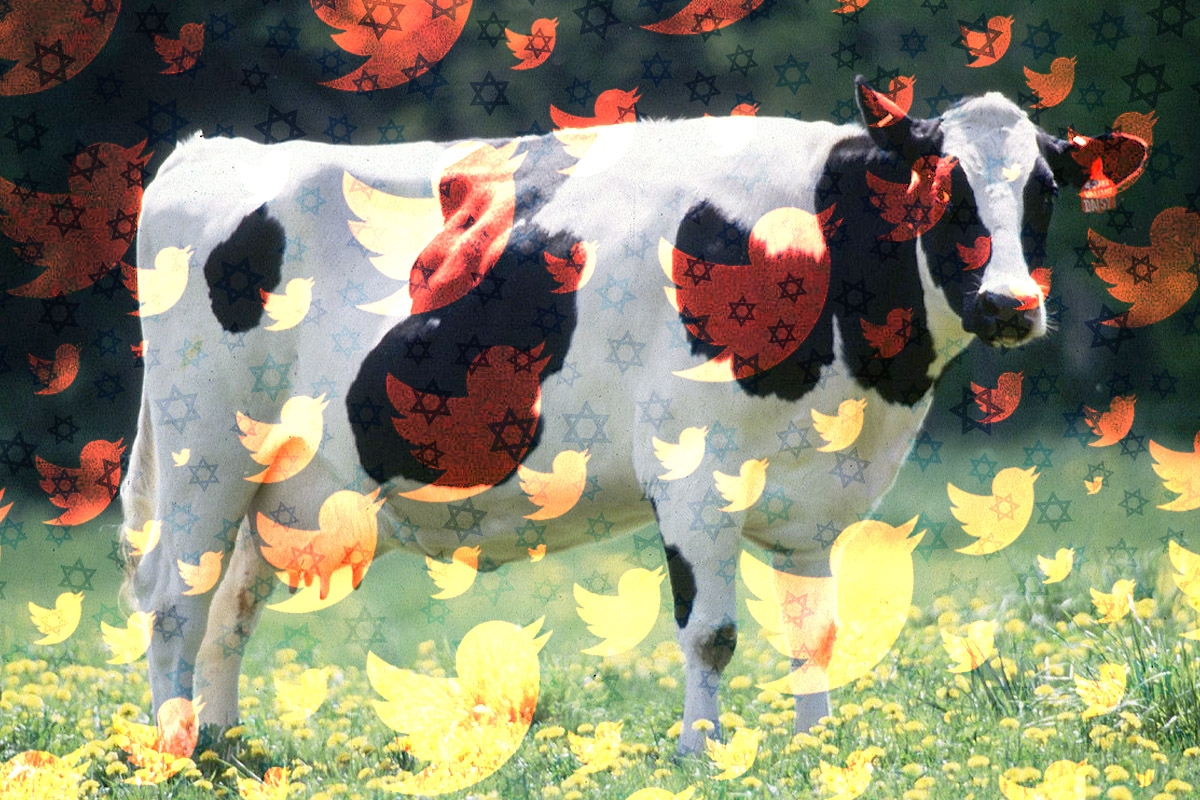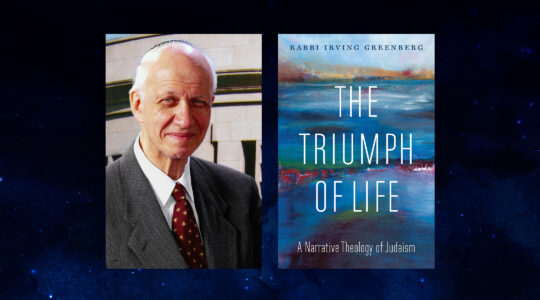This article originally appeared on Alma.
There’s not a whole lot I can tell you about the person who runs @antisemitismcow. The Twitter account, which launched in June, quickly became a legend on Jewish Twitter and beyond by “mooing” at anti-Semitism on the platform. Yes, I said mooing, because @antisemitismcow is, well, a cow.
In seven short (or long, depending on your sense of pandemic timing) months, the account amassed over 21,000 followers and endless speculation about the human behind it. I can confirm that there is indeed a human behind it — a Jewish human, at that — but not much else. The nature of the account, which regularly mooed at white supremacists and other bigots, means anonymity is key to maintaining safety.
On Nov. 17, @antisemitismcow tweeted the word “GOOOOOOOOODBYYYYYYE” with a gif of an exploding cow. The tweet received over 400 responses, many from people bereft that their beloved @antisemitismcow was apparently mooooving on.
But is the cow actually calling it quits? Over a series of phone calls, I talked to the human behind the cow to find out the impetus for the account, why anti-Semitism and other forms of hate thrive on places like Twitter, whether there’s anything average users can actually do about that and what prompted the cow to tweet goodbye.
I was assured it’s very possible that @antisemitismcow could come back at any time, if the mood strikes. Until then, here’s an exclusive interview with @antisemitismcow, who is using good old human words to speak out for the first time.
Obviously I want to talk about why you stopped running it for now, but I would love to start with the beginning: What was the impetus for creating the @antisemitismcow account?
It started mainly as a spur-of-the-moment joke. I had always admired and loved the @racismdog account — the idea of refusing to engage in the way that trolls often want you to engage them, which is they want you to debate them, they want you to get sucked into their logic and to engage on their level. And I thought the idea of an animal account was so hilarious and such a great kind of refusal to engage in that sort of dialogue.
And then I saw a tweet by [American actor] James Woods that was, in my mind, overtly anti-Semitic. What bothered me about that particular tweet was that I knew no one was going to care about it.
https://twitter.com/AntisemitismCow/status/1268635000733347847
https://twitter.com/AntisemitismCow/status/1269614091699728384
That moment was more of a one-off kind of joke and attack on the kind of people that refuse to stand up and say something about that kind of anti-Semitism. And so I created this account, and it mooed at James Woods. After that I kind of got hooked.
At that point, what did you see as the mission of @antisemitismcow?
I really felt like there was this great tool to educate people, as well as do what I consider to be countertrolling. Twitter in particular is built for trolling. What happens is that these trolls gain followings very easily. And I think it’s part of the reason we have a higher rate of extremism in America.
A lot of the good people on social media — the people that really care about making a difference — are often disinclined, at first at least, to engage in trolling. They want to have this kind of fair discussion; they really believe in that, for good reason. But the problem is that the technology itself is not built for that. The technology itself is built to pile on people, to attack people, to hurt people. Essentially my goal as I was using this account, seeing the potential effect it could have, was to work with the technology against the people that the technology promotes.
Why a cow?
I knew that I was doing a copy of @racismdog. I feel like so many Jewish things are silly, third-rate copies of non-Jewish things. I wanted to play into that and just make it even more ridiculous than it was. Part of the goal with the account is also to make people aware of the absurdity of it all. This whole thing that we’re engaging in, any form of anti-Semitism — whether it’s a trope or a mistake or purposefully evil — is inherently ridiculous because by definition it goes against reality.
Did you always know that you were going to have to keep it completely anonymous?
I didn’t at first. But as I was using it, and it started to become popular, it became very clear to me how important it was to stay anonymous. Part of it was on a more philosophical level — the trolling aspect of the account kind of requires anonymity because you’re playing the game of the trolls. And I think the anonymity of trolls gives them a lot of power to do things that they wouldn’t otherwise normally do. It’s an effective tool.
Then there was also just the safety issue. I draw attention to dangerous views, dangerous accounts or, at the very least, someone making an honest mistake that needs to be corrected. It needed to grow quickly in order for it to be effective. And the more that it grew, the more it would get attention. And so what that meant is that it became a very quick target for white nationalists.
The funny thing about these people is that they’re so stupid, they’re hilariously stupid. And what made me really aware of why anonymity was important was because at a certain point, [an account that was targeting @antisemitismcow] decided that someone who was a big fan of my account — she was 17 years old, I think — was the person running @antisemitismcow, and he decided to send all his followers after her. It was really horrible. It was the first time I went “out of character” and wrote out, hey, Nazis are idiots, they think that this person is the @antisemitismcow but she’s not, if you see it, report it. At the same time, I was also getting a lot of private messages from white nationalists and whatnot sending the cow threats and saying they were going to come for me.
Then [that same account] decided it was someone else who was a huge fan of mine — this guy who, as far as I can tell, seems like a sweet guy. I started getting messages from people sharing his private information with the cow, essentially not making enough of a threat that it could be actionable, legally speaking, but enough of a threat that it’s very clear what they were going for.
How did you grow the account to the 21.9K followers it currently has?
The way I grew it was by being a troll. And I mean that, like, very literally. It’s very easy to grow an account on Twitter if you are a troll because all you need is a niche audience that believes in what you’re doing. You need people that love ratioing other people [when a tweet gets more negative responses than retweets or likes]; you need a certain amount of interest in vengeance on your side. And then you throw in the fact that I wouldn’t just be mooing at small accounts, I’d also be mooing at politicians and big-name accounts as well. Then people start tagging the account and all of a sudden, even when the cow is not mooing at things, it’s still getting attention.
At the height of it, how much time were you spending on @antisemitismcow?
Too much time? I don’t know, just hours. Part of my goal was to break open things that people don’t necessarily think about as much, to show the things that I was seeing that were happening a lot on Twitter but that weren’t necessarily acknowledged. So, for example, Rothschild conspiracies, while always powerful, were very clearly rising during the rise of coronavirus. With the rise of QAnon, all these people were really spreading the Rothschilds conspiracy. Not that it needed any help, but unfortunately it was getting helped.
And so I would spend a lot of time trying to find those accounts. I spent time researching and trying to understand code words — people speak about Jews online so that they don’t come up on a quick search. It was important to get an understanding of how these accounts were able to spread bigotry in a coded way that then became unpacked by their followers. So yeah, it took up too much time.
It sounds like part of the mission was not only to call out people who were being anti-Semitic, but also to educate people about what anti-Semitism today actually looks like.
Yes. As I started to get challenges, I was trying to figure out how to deal with people who were like, “This is not anti-Semitism! How dare you?” Especially because a sizable percentage of the tweets that @antisemitismcow mooed at were just completely honest mistakes.
A good example of that was the Stephen Miller “lizard person” comparison. It’s a very old anti-Semitic caricature that Jews are creatures, that they’re subhuman. And then there are people like David Icke who spread the idea that Jews are actually lizard people; they literally believe that Jews are lizard people controlling the world. And then you have a powerful Jew [like Miller] who’s reviled by a lot of people. And it’s natural, when you feel that way about someone, to respond in a way that dehumanizes them.
That’s the thing that people don’t understand about anti-Semitism and anti-Semitic tropes: There is a reason that it just “coincidentally” happens to Jews more than others because this is part of our cultural fabric. And so part of the goal was to point those out. And then there’d be a big backlash, partly because people rightly believed that the intention wasn’t anti-Semitic. But the goal of the account was not to point out people’s intentions but to point out anti-Semitism itself. And so at that point, I started thinking, OK, I need to find a way to help people understand this without spelling it out for them.
How’d you do that?
I would post screenshots from Wikipedia and elsewhere [to explain the tropes], and I actually realized that it was a great educational tool because it kind of depersonalized things and made it less about me, or whoever runs the account, and more like, OK, look at this, read it, you don’t have to agree with it.
https://twitter.com/AntisemitismCow/status/1324190070530699267
You mentioned earlier how the account started getting harassed by white nationalists and far-right accounts. Did you get hate from any other groups of people?
Yeah, people started trolling @antisemitismcow quite hard on the “dirtbag left.” This is a group of people who are pretty influential, in a sense, because they have large followings. They’re verified, they have high engagement, they have a lot of interest. And they’re essentially left-wing trolls, I would say. They tend to attack the left more than they attack the right, which I find really interesting,
And they kind of became obsessed with @antisemitismcow, I think partly because it eluded them. They would make fun of the account, but they would tend to wait for [me to post] anything especially revolving around Israel.
There are instances when not every Jew agrees on whether something is anti-Semitic or not. I probably see this the most when it comes to Israel and the question of whether anti-Zionism is always anti-Semitic. How did you deal with that?
I believe that the discourse around anti-Zionism, Zionism and anti-Semitism is broken. I think most people can agree on that. But I think the whole reason these discussions get so bogged down is because there’s so much obsession over that question of whether anti-Zionism is anti-Semitism.
My goal was to keep an eye out for anti-Zionist stuff but only when it’s actually using an anti-Semitic trope. Suddenly there’s a Jewish state, historically speaking, and we’re dealing with different forms of anti-Semitism that might come out of it. But also we’re dealing with a lot of intergenerational trauma that revolves around the state, in a lot of ways.
And so what that results in is a lot of confusion around the discussion and a lot of bad faith actors that use it to their advantage. There’s a great deal to be gained by confusion on social media. Social media does not reward confusion; it rewards certainty. People who are uncertain about this discussion, because it’s not an easy question, are prone to be less vocal on social media because if they’re vague, they’re more likely to be misread or dogpiled. So I inherently knew that it was going to be a problematic area to enter, but I felt that the only way to balance this was to find things that I felt were either anti-Semitic tropes that were obvious in my opinion or were tokenizing.
The irony is that as much as there were people accusing the account of being a “pro-Israel account,” the backlash that I got earliest and most often was by people very upset when they would tag me in someone criticizing the Israeli government or using the word genocide — things that someone might have personal opinions about but are not anti-Semitic by nature. But people aren’t seeing what you’re ignoring. Especially in the beginning, I probably got, like, 100 tweets a day from people encouraging @antisemitismcow to call out criticisms of Israel, but the majority of them I ignored because I thought that they were not actual anti-Semitism. But I would take each one seriously, look at each one and really examine whether it fell under a canard or a trope, and run with it if it was.
Well, let’s get to it. Why did you decide to stop tweeting from the account?
https://twitter.com/AntisemitismCow/status/1328880236704927744
There was a combination of factors, and I think it would be very easy to blame certain people for shutting down the account. But the truth is that the whole reason I shut it down was because of Twitter, essentially. Because of the system. As much as people like to get pissed off at individuals on Twitter, Twitter is a system that, by definition, creates a poisonous dynamic between people.
But there were a number of things that kind of happened at once. First, I was getting more and more concerned about followers being targeted and that sort of thing. The second thing was that the account got shadow banned, ironically, for a very stupid reason. I posted one of those prompts for people on Twitter that was like, “Like this tweet to get one new fact about me.” The whole thing about the account was that it doesn’t reveal anything besides the fact that it’s a cow. So every time it got a like, the cow responded with that picture “I am cow” over and over and over again. And Twitter sees that as spamming. And I kept doing it, which was stupid of me. I was just too excited about this joke, having too much fun with it. And I am pretty sure that that was essentially the beginning of the shadow ban. So the replies from the cow were not even showing up at all. This was a huge problem for the account. [Editor’s note: It appears the @antisemitismcow account is no longer shadow banned, which is one more reason why the cow might return.]
But I thought it was a really good example of the system and how broken it is on Twitter.
Social media companies are so profit-driven, so obsessed with automation that doesn’t require them to actually put in work and, more importantly, money. An effective moderation tool on Twitter or Facebook would involve experts. What they do right now is they hire very low-paid people to look at horrific things all day. There are articles about this, how most of them suffer trauma from it because they have seen some of the most disgusting things. So essentially, people that aren’t experts are the moderators, and most of it is actually run by algorithms. Twitter will do anything it can to make sure they have as many active users as they can. Kicking people off Twitter goes against their business model. Essentially what they’re doing is balancing their business model against the potential negative PR they would get from having hatred on their website.
So what they do is they put minimal resources towards [moderation], they spend as little as they possibly can, relative to the amount of investment they put into everything else. There’s a reason that David Duke had a [Twitter] account for so long. It’s not because there weren’t people reporting him. There were people reporting him day after day after day. What happened was they got negative PR.
The whole point of @antisemitismcow was to push against Twitter’s approach. It was, by definition, to challenge Twitter more than anything because it’s really Twitter that empowers poisonous rhetoric. So that shadow banning for me was kind of a wake-up call; I wasn’t sure if @antisemitismcow was up for beating the system. I don’t know if one account can do that.
Do you think there will ever be a more effective way to combat this system?
I think until the incentives for social media companies change, it’s not going to change. They have incredible power within their platforms. No one is going to stop Mark Zuckerberg from running an absolutely shitty service that happens to have a lot of users and thus, by definition, is almost impossible to compete with as a social media platform when he owns the majority of the company, right? Jack Dorsey has more of a chance of changing but it seems, again, no one running a company like that is going to voluntarily spend money on the things that hurt their business.
One argument could be made that if you make enough bad PR for them, they’ll adapt. But that’s not really true. The ADL, the largest and arguably most powerful Jewish advocacy group in America, has a huge campaign against Facebook trying to get people to pull funding from Facebook and all these things, which is a big deal. I mean, the ADL will more often try and work with companies like that. The fact that they kind of gave up hope is a bad sign for Facebook. Not a bad sign for Facebook, the company, but for people who use Facebook.
These tech companies just have way too much power and no accountability at all. They are brought into Senate hearings by old men that don’t understand how the services work. And [the tech executives] talk circles around them. It’s pathetic to watch. Until there’s a generation of powermakers in America that truly understand social media, and truly understand how to deal with social media, I don’t think anything’s going to change.
There needs to be something that disrupts their power, but I’m not sure what that is. I’m not a policymaker or anything. I’m just a person who runs a cow account.
So do you think it’s a waste of time to report people on Twitter? Because I’m personally kind of addicted to it.
It is important to report these accounts. But that’s not enough at all. People think that they’re making a difference by their reporting — and again, I’m not trying to say people shouldn’t report, they should if they see something gross — but they should also understand that they’re dealing with Twitter. It’s like asking a dictatorship to put a dangerous person in jail. At the end of the day, whether they go along with it or not, the dictatorship is still giving those people a platform, it’s still an evil empire and you’re still playing by their rules.
When I was running the account, I would rarely celebrate a suspension that I saw through the account. It happened quite often, but for the most part, what I would celebrate is when a huge account got disabled, like David Duke. But there are still huge verified accounts that are constantly, overtly anti-Semitic. It’s just a reminder that with all this reporting, you’re just going by what Twitter feels like engaging with or not. If anything, I think it actually psychologically gives you the experience of thinking positively of Twitter.
https://twitter.com/AntisemitismCow/status/1323768567024640000
Right, like, “Oh look! I reported somebody and now they’ve been suspended! I did good, it’s working!”
You feel grateful to Twitter when you should feel like, why were they there? It should take two seconds for someone saying “Jews should burn in hell” [to get banned]. But accounts like this have been around for 10 years, you know?
How are you left feeling after this sort of experiment? Do you have a different view of Twitter or anti-Semitism (or cows) from when you started?
I don’t know that much has changed, to be honest with you. It was an experiment that confirmed most of what I thought already, unfortunately. The bigger question was, can I do something that uses the nature of the company to subvert it, which I do still think is possible. And which is why I might still go back to it.
Most people know how social media has become the breeding spot, the central location, the organizing force behind hate movements, behind spreading tropes, and just so much horrible viciousness that is of course not limited to anti-Semitism, and not even limited to bigotry. It’s just, in general, a poisonous system.
So my real hope, honestly, is that if you use a product so much, you should know it well, and you should care about it. Social media has become such a fabric of our society that people wrongly engage with it as if it’s neutral. It’s not. It’s a product built by humans, a very flawed product that’s not even made for us — it’s made for advertisers, which is the only reason it’s free. It takes our time. It takes our mental health. It takes so much from us, and it’s arguable whether the returns are commensurate with the amount we invest in social media.
The irony of this account is that people wanted so much to believe that this or that group of people had shut down the account. And I’m sorry to disappoint them but it wasn’t any one group. It was social media itself.







